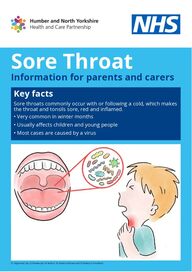
Return to flip book view
Sore ThroatInformation for parents and carersKey factsSore throats commonly occur with or following a cold, which makesthe throat and tonsils sore, red and inflamed.• Very common in winter months• Usually affects children and young people • Most cases are caused by a virusV1 Approved: Jan 22 Review Jan 24 Author: Dr Rebecca Brown and Dr Rebecca Proudfoot
Symptoms often seenwith Sore Throat Nausea Tiredness Coughing Headache High temperature Pain on swallowing Swollen glands in neck
How is it diagnosed?If glandular fever is suspected, bloodscan be done to confirm the diagnosis.You will be asked questions about your child’s symptoms. The clinician will look in your child’s throat.Most of the time further tests are not needed.
Caring for your child at homeEnsure they get plenty of restGive your child smaller amounts of fluid,more oftenMany children refuse to eat. This is not aproblem, as long as they stay hydrated. Offersmall snacksBenzydamine spray is a local anti-inflammatorytreatment that can help soothe a sore throatIf your child does not have any red or amber symptoms in the trafficlight advice then you can care for your child at home.If your child is already taking medicines or inhalers, you shouldcarry on using these. Most sore throats get better without anyspecific treatment. If your child has a sore throat, you can help them bydoing the following:1234
56If your child is in pain or distressed and over 3months old, you can give them liquidparacetamol or ibuprofen.At home, we do not recommend givingparacetamol and ibuprofen at the same time.If your child has not improved after two tothree hours you may want to give them theother medicine. Never exceed the dose on thepackaging.Make sure your child is never exposed to tobacco smoke.Passive smoking can seriously damage children’s health.It can make breathing problems worse.Remember, smoke remains on your clothes when you smoke anywhere, including outside.It is very important to continue the wholecourse of antibiotics even if your child seemsbetter .
Treatmentshas pus on the tonsilsdoes not have a coughhas a high temperaturenot easing after a few dayshas tender lymph glands in the neckIt is common for a doctor to advise a ‘wait and see’ approach for three days, in most cases the infection does clear. However, if it doesn’t clear then antibioticsmay be advised.Most sore throats clear up within two to threedays and don’t need any specific treatment.Antibiotics aren’t routinely used to treat sorethroats, this is because the infection usually clearswithin three days on its own and antibiotics oftenmake no difference to the speed of this. Althoughthey may occasionally be prescribed if symptomspersist or are particularly severe. Antibiotics canget rid of ‘friendly bacteria’ from the gut, whichcan temporarily upset the bowels. Overuse ofantibiotics encourages resistant bugs to breed.Antibiotics are more likely to be prescribed if your child